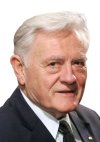
As Lithuania inaugurated its first female president, Dalia Grybauskaite, on July 19 this year, outgoing president Valdas Adamkus reflected on his decade in the role. Mr Adamkus served two five-year terms, and oversaw the transition from socialist state to free market economy. Lithuania then emerged as one of the fastest growing economies within the EU.
Mr Adamkus’s vision of a free market economy for his homeland was formed through his experience as part of the Lithuanian diaspora, living both in Germany and later the US following the Soviet occupation of Lithuania during the Second World War. He worked for many years for the US Environmental Protection Agency, and was appointed regional administrator by then president Ronald Reagan in 1981, where he served for 16 years before retiring in 1997 after 29 years of federal service. But giving up work was out of the question – hence his presidential career.
Advertisement
Though economic growth has been severely halted in the Baltic state, Mr Adamkus says the current global crisis is simply a temporary recession made worse by inadequate preparation. “We have not accumulated financial reserves or budgetary surpluses throughout the years of fast economic growth, so the current downturn will require more painful budgetary cuts than otherwise expected,” he says.
While FDI inflows are the lifeblood of the economy, Mr Adamkus knows Lithuania is in no position to guarantee any level of success for foreign investors at this point in the country’s economic cycle. He is therefore not surprised that inward investment is slowing down. “There are some exceptions and there are companies from the West looking around for future opportunities,” he says.
Westernised working
The current situation is a different story from the growing levels of foreign investment during the 19 years since Soviet independence, a period in which Lithuania has done better than most other post-communist countries. “It’s not such a long time since we broke away from a system where you had to do exactly what your big boss was telling you, which gave Lithuanians the feeling that we had to do better, says Mr Adamkus. And given the opportunity again after surviving the global crisis, he is convinced that in the next 15 years Lithuania will look like any other Western city. “My biggest challenge has been to turn around 50 years of the socialist concept of a regulated economy towards open markets,” he says. Lithuania became a full member of the Schengen Agreement in December 2007.
As a member of the EU, Lithuania is involved in many issues. Mr Adamkus has been extremely vocal on the issue of energy, campaigning to bring Lithuania into the EU fold rather than remain dependent on Russia for the country’s needs. “I believe a lot of progress has been made and I’m positive that we will be sharing the same resources, electricity and natural gas as the rest of Europe to help us become a productive country, even though it may take five to eight years to do so,” he says.
Teaching agenda
Another issue high on Mr Adamkus’s list of priorities, whatever his future path, is education. Lithuania has a highly qualified workforce which remains competitive despite the wage rises of recent years. Though adamant he will not join any political party, he does intend to maintain a public-focused career, perhaps dealing with students as a visiting professor. “Then again I may also share my experience with the government,” he says, adding: “I can assure you I won’t be buying a rocking chair and watching TV for hours on end.”
Advertisement
CURRICULUM VITAE
VALDAS ADAMKUS
2004Republic of Lithuania
Re-elected as president
1998Republic of Lithuania
President
1981
Environmental Protection Agency, US
Regional administrator